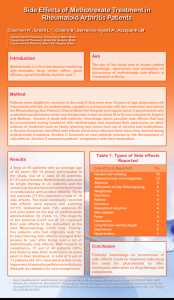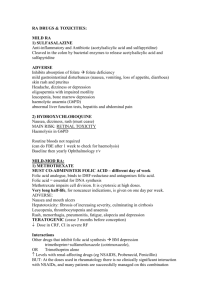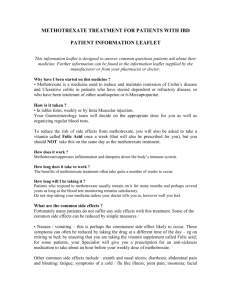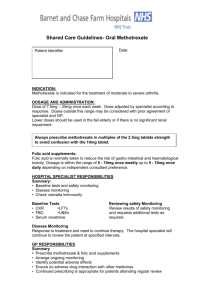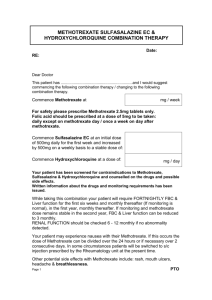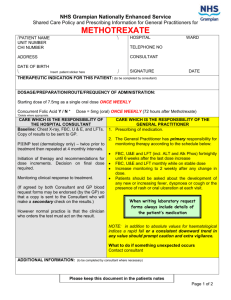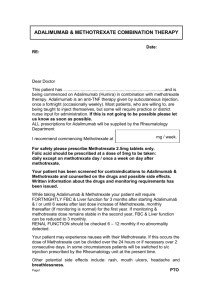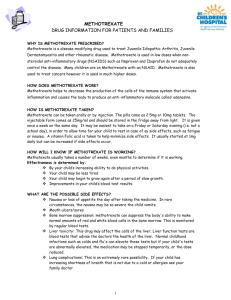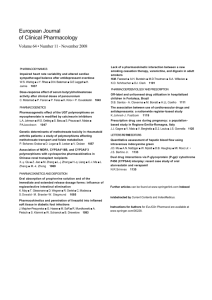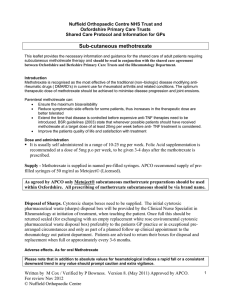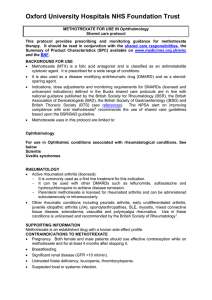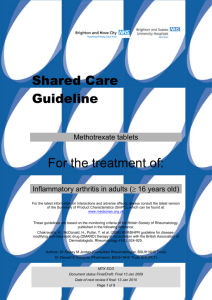guideline for the prescription and monitoring of
advertisement
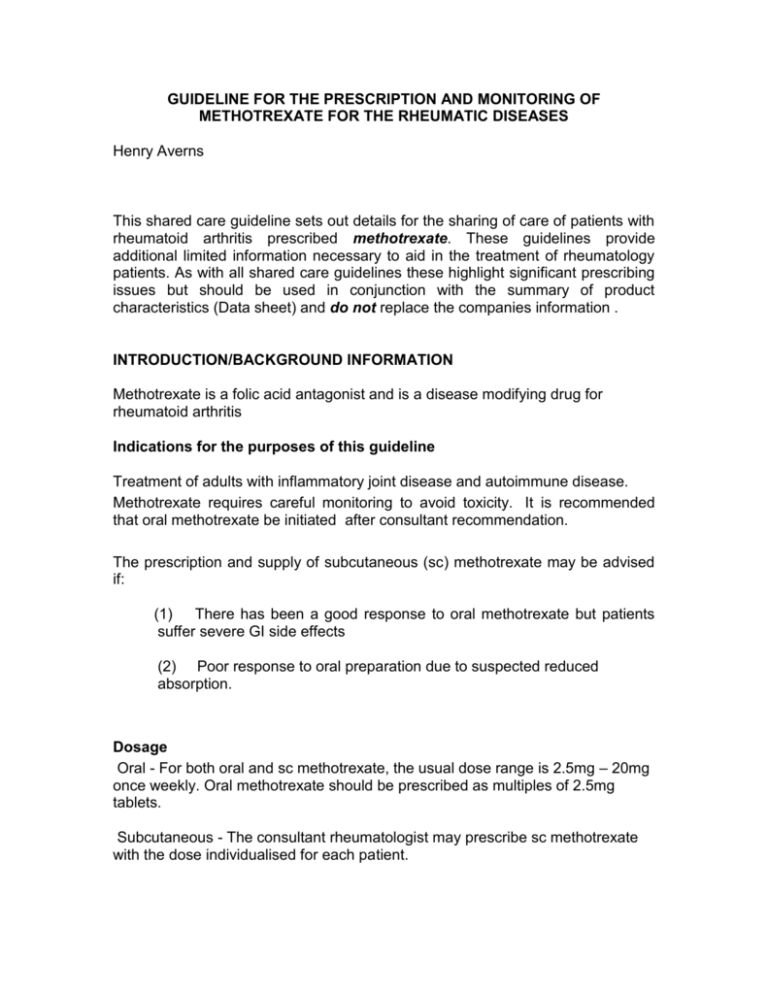
GUIDELINE FOR THE PRESCRIPTION AND MONITORING OF METHOTREXATE FOR THE RHEUMATIC DISEASES Henry Averns This shared care guideline sets out details for the sharing of care of patients with rheumatoid arthritis prescribed methotrexate. These guidelines provide additional limited information necessary to aid in the treatment of rheumatology patients. As with all shared care guidelines these highlight significant prescribing issues but should be used in conjunction with the summary of product characteristics (Data sheet) and do not replace the companies information . INTRODUCTION/BACKGROUND INFORMATION Methotrexate is a folic acid antagonist and is a disease modifying drug for rheumatoid arthritis Indications for the purposes of this guideline Treatment of adults with inflammatory joint disease and autoimmune disease. Methotrexate requires careful monitoring to avoid toxicity. It is recommended that oral methotrexate be initiated after consultant recommendation. The prescription and supply of subcutaneous (sc) methotrexate may be advised if: (1) There has been a good response to oral methotrexate but patients suffer severe GI side effects (2) Poor response to oral preparation due to suspected reduced absorption. Dosage Oral - For both oral and sc methotrexate, the usual dose range is 2.5mg – 20mg once weekly. Oral methotrexate should be prescribed as multiples of 2.5mg tablets. Subcutaneous - The consultant rheumatologist may prescribe sc methotrexate with the dose individualised for each patient. To limit the side effects of methotrexate, all patients should receive folic acid 5mg orally daily except on the day they take methotrexate. Contraindications Severe/significant renal or hepatic impairment Active acute infectious disease, evidence of immunodeficiency syndrome Serious cases of anaemia, leucopenia, thrombocytopenia Receiving drugs with antifolate properties e.g. co-trimoxazole, trimethoprim, sulphonamides Breastfeeding Pregnancy - Methotrexate can affect fertility of men and women and is contra-indicated prior to conception and for at least six months after treatment. Treatment with methotrexate has the potential to affect the development of the unborn child and both men and women of childbearing age should use a reliable method of contraception to avoid the risk of an unplanned pregnancy during treatment. When planning a pregnancy it is important that both men and women on this drug discuss medication with the Rheumatology Team (at least six months before conception). Precautions Elderly (consider reduction in dose) Bone Marrow Disease Renal impairment (reduce dose) Alcohol consumption - recommended maximum of 5-10 units per week. Monitoring Patients must report mouth ulcers, sore throat, fever, epistaxis, unexpected bruising or bleeding, shortness of breath, and any unexplained illness/infection and should be seen urgently for full blood count and liver function tests and CXR if pulmonary symptoms. Prior to starting therapy , Chest x-ray Assessment of renal and liver function, fbc Ongoing Monitoring: It is recommended that all blood counts are monitored and recorded carefully. FBC, renal function and LFTs fortnightly for 3 months and monthly thereafter. If there is evidence of renal impairment check that renal function has not deteriorated after 4 weeks. FBC should be measured one week after any increase in dose. In order to monitor disease activity a 3 monthly CRP would be helpful. Always look at the mean corpuscular volume (MCV). A rising value may precede marrow dysplasia…BUT check for underlying causes before stopping treatment (B12, TFT, folate and alcohol consumption) Stop and refer to the rheumatology team if: WCC falls on 3 successive occasions and/or WCC falls below 3.5 x 109. Platelet count falls on 3 successive occasions Platelet count falls below 150 x 109 Liver enzymes especially transaminase increased x 3 upper limit of normal Consecutive significant fall in albumin – seek specialist opinion Severe nausea or diarrhoea Severe mouth or genital ulceration NB: Do not stop treatment prior to surgery Side effects Very common > [1 in 10] > Common > [1 in 100] > Uncommon > [1 in 1000] > Rare > [1 in 10000] > Very rare NB. The risk of side effects indicated are relative to all the licensed uses of methotrexate and are expected to be less common when taken at low dose on a weekly basis. Very common/Common: Mouth ulcers Nausea and diarrhoea Hair loss Uncommon: Very rare: Headaches Bone marrow suppression Lung and liver inflammation Renal impairment Drowsiness Anaphylactic reaction Some patients report cognitive effects and if you suspect any thing like this contact the rheumatologist Common/Significant Drug Interactions Folate antagonists should be avoided – nitrous oxide, co-trimoxazole, trimethoprim, sulphonamides, phenytoin and some antimalarials e.g. pyrimethamine. NSAIDs (including aspirin) – will increase levels of methotrexate. This is not considered to be a problem in patients with Rheumatoid arthritis as the doses used take this interaction into account. Ciclosporin Retinoids e.g. Acitretin and Etretinate Clozapine Drugs affecting renal tubular transport Caution when co-prescribing hepatic or nephrotoxic drugs Vaccinations - Live attenuated vaccines should be avoided. For additional information refer to the British Society of Rheumatology guidance on vaccinations for immunosuppressed patients http://www.rheumatology.org.uk/guidelines/clinicalguidelines/vaccineguidel ine Notes Passive immunisation should be carried out using Varicella Zoster Immunoglobulin (VZIG) in non-immune patients if exposed to chickenpox or shingles. Flu and Pneumococcal vaccines can be given. Methotrexate can cause dizziness, fatigue, blurred vision and eyeirritation, which may affect the ability to drive or operate machinery. References 1. Summary of Product Characteristics Maxtrex (Wyeth) / Methotrexate (Mayne Pharma) January 2006. 2. British Society of Rheumatologists Guidelines August 2000. 3. Folic acid and folinic acid for reducing side effects in patients receiving methotrexate for rheumatoid arthritis. Z Ortiz, D Moher, BJ Shea, ME SuarezAlmazor, P Tugwell, G Wells Year: 1999. Reported at Cochrane Library 4. NPSA Towards safer use of Methotrexate http://www.npsa.nhs.uk/site/media/documents/716_towards_safer_use_oral _methotrexate.pdf H L Averns Date of Issue September 2003 / Updated Nov 2006 Review Date Nov 2008
